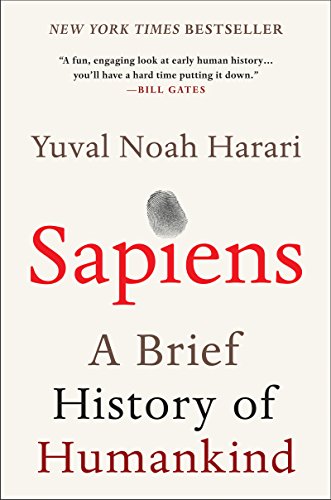

This article is an excerpt from the Shortform summary of "Sapiens: A Brief History of Humankind" by Yuval Noah Harari. Shortform has the world's best summaries of books you should be reading.
Like this article? Sign up for a free trial here .
What is the origin of monotheism? How did our ancestors move from worshipping many gods to worshipping a single God?
The origin of monotheism is in the individual’s fondness for one particular god in a polytheistic religion. People started worshipping a single, favorite god, and this single god retained the biases and interests of the polytheistic gods.
We’ll cover the origin of monotheism from polytheism and how this lay the foundation for some of the most widespread religions today.
The Origin of Monotheism: Polytheism
Before we look at the origin of monotheism, we need to understand polytheism.
The Agricultural Revolution led to a religious revolution. In previous, animistic belief systems, man was no better than other animals, plants, and geographical features. For instance, man didn’t consider himself superior to a sheep just because he hunted sheep, just as he wouldn’t consider himself inferior to tigers just because they hunted him.
But when hunter-gatherers became farmers, suddenly man had dominion. Rather than equals in the spiritual realm, sheep and grains became objects farmers owned and protected jealously. Man and his concerns became the center of religious belief. The job of gods was to mediate between humans and the rest of the natural world, over which man now wanted control. Humans worshipped gods in return for dominance over plants and animals.
The Rise of Monotheism
Over time, some polytheistic worshippers became particularly fond of one deity over the others and eventually started worshipping only that deity. This was the origin of monotheism.
This single god retained the biases and interests of the polytheistic gods. Unlike the supreme powers of polytheism, who were impersonal and uninterested in the lives of humans, monotheism’s supreme powers had personalities and took an active role in the human world. This meant people could negotiate with God, praying to Him and providing offerings. You can only negotiate with a divine being if that divine being has biases and can intervene in the human world. This contributed to the origin of monotheism.
The first monotheistic religions, like the worship of Aten in Egypt and early Judaism, failed to spread because they weren’t universal. For instance, the Jewish God was only interested in Israel and the Jewish people, so Judaism didn’t have much to offer people of different ethnicities who lived outside of Israel.
Christianity, however, had growing power. It was the first missionary religion. Christians believed that their incarnated supreme power had died on the cross for the sins of all humans, making this a religion applicable to everyone. Paul of Tarsus, one of the first leaders of what was then a Jewish sect, believed everyone should know the gospel, the good news that Jesus had died for their salvation. So Christianity was both universal and missionary, meeting the requirements of a revolution-inciting religion. After the origin of monotheism, Christianity spread monotheism throughout the world.
The Benefits of Intolerance in Monotheism
The origin of monotheism brought less tolerance of other religious beliefs. Monotheism is inherently less tolerant than polytheism. If you only believe in one god, and believe that this god is the supreme power of the entire universe, you can’t also believe in the existence of another religion’s god. Your god has to be the only god. Therefore, in order to convert others to your religion, you need to discredit all the other gods and the religions built around them. This belief in one truth has made monotheists far more fervent in spreading their truth, discrediting other religions, and converting non-believers around the world.
Monotheism’s lack of tolerance, ironically, allowed it to spread and take over. In the first century AD, there were few monotheists. By the 16th century, monotheistic religions dominated most of Europe, Asia, and Africa. Today, almost everyone outside of East Asia practices a monotheistic religion, and our global imagined political order is bolstered by monotheism. Intolerance was both the downside and the benefit of the origin of monotheism.
What Constitutes a Religion?
After looking at the origin of monotheism, it’s relevant to discuss what constitutes a religion. Let’s look first at the definition and requirements that make a belief system a religion, and then we’ll look at the additional requirements that give particular religions their unifying function.
To be a religion, a system has to meet two requirements:
- The system has to be predicated on the belief in a “superhuman” order. As used here, “superhuman” is defined as “not the product of human actions.” For instance, professional soccer shares a lot in common with religion: it contains rituals, rites, and laws. But because these rituals and laws are determined by humans (in this case, FIFA), professional soccer isn’t a religion.
- The system must establish norms and values, like modesty in dress or showing compassion. Many people believe in ghosts, but these beliefs don’t give us moral standards to meet, so they don’t constitute a religion.
The origin of monotheism met both these requirements. The religions that revolutionized the world and led us toward a more global empire have two more requirements.
- The system must be universal. Believers must believe that their system is true everywhere and applicable to everyone. Below, we’ll look at how local religions like animism gave way to universal religions like Christianity.
- The system must be missionary. Believers must be fanatical about spreading the universal truth of their system to everyone on earth.
Religions that are both universal and missionary appear relatively recently in history. These religions have the power to bolster our imagined social orders and unify humanity on a grand scale.
———End of Preview———

Like what you just read? Read the rest of the world's best summary of "Sapiens" at Shortform . Learn the book's critical concepts in 20 minutes or less .
Here's what you'll find in our full Sapiens summary :
- How Sapiens outlived and outlasted the 8+ other human-like species on Earth
- The 3 critical revolutions in human existence that led to our domination of the planet
- How much of what powers our world today is really just a shared mass delusion
- What the future of humanity might look like






